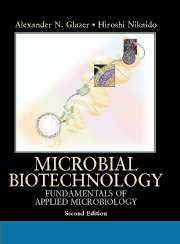Book contents
- Frontmatter
- Contents
- Preamble
- Acknowledgments
- 1 Microbial Diversity
- 2 Microbial Biotechnology: Scope, Techniques, Examples
- 3 Production of Proteins in Bacteria and Yeast
- 4 The World of “Omics”: Genomics, Transcriptomics, Proteomics, and Metabolomics
- 5 Recombinant and Synthetic Vaccines
- 6 Plant–Microbe Interactions
- 7 Bacillus thuringiensis (Bt) Toxins: Microbial Insecticides
- 8 Microbial Polysaccharides and Polyesters
- 9 Primary Metabolites: Organic Acids and Amino Acids
- 10 Secondary Metabolites: Antibiotics and More
- 11 Biocatalysis in Organic Chemistry
- 12 Biomass
- 13 Ethanol
- 14 Environmental Applications
- Index
- Plate section
3 - Production of Proteins in Bacteria and Yeast
Published online by Cambridge University Press: 05 June 2012
- Frontmatter
- Contents
- Preamble
- Acknowledgments
- 1 Microbial Diversity
- 2 Microbial Biotechnology: Scope, Techniques, Examples
- 3 Production of Proteins in Bacteria and Yeast
- 4 The World of “Omics”: Genomics, Transcriptomics, Proteomics, and Metabolomics
- 5 Recombinant and Synthetic Vaccines
- 6 Plant–Microbe Interactions
- 7 Bacillus thuringiensis (Bt) Toxins: Microbial Insecticides
- 8 Microbial Polysaccharides and Polyesters
- 9 Primary Metabolites: Organic Acids and Amino Acids
- 10 Secondary Metabolites: Antibiotics and More
- 11 Biocatalysis in Organic Chemistry
- 12 Biomass
- 13 Ethanol
- 14 Environmental Applications
- Index
- Plate section
Summary
The human body functions properly only when thousands of bioactive peptides and proteins – hormones, lymphokines, interferons, various enzymes – are produced in precisely regulated amounts, and serious diseases result whenever any of these macromolecules are in short supply. Until 1982, however, the only available pharmaceutical preparations of these peptides and proteins for the treatment of such diseases were obtained from animal sources, and they were sometimes prohibitively expensive. Bioactive proteins and peptides typically occur at low concentrations in animal tissues, so it was difficult to purify significant amounts for medical use. Some important proteins, such as pituitary growth hormone, differ in animals and humans to the extent that a preparation of animal origin is useless for treating humans. Finally, it was extremely difficult to isolate labile macromolecules from human and animal tissues without running some risk that the products might be contaminated by viral particles and viral nucleic acids.
The introduction of recombinant DNA techniques brought about a revolution in the production of these compounds (Chapter 2). It is now possible to clone a DNA segment coding for a protein and introduce the cloned fragment into a suitable microorganism, such as Escherichia coli or the yeast Saccharomyces cerevisiae. The “engineered” microorganism then works as a living factory, producing very large amounts of rare peptides and proteins from the inexpensive ingredients of the culture medium. And with such products obtained in this way from pure cultures of microorganisms, there is no chance of contamination by viruses harmful to humans.
- Type
- Chapter
- Information
- Microbial BiotechnologyFundamentals of Applied Microbiology, pp. 90 - 146Publisher: Cambridge University PressPrint publication year: 2007

